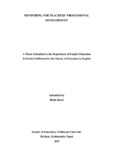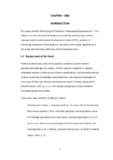Please use this identifier to cite or link to this item:
https://elibrary.tucl.edu.np/handle/123456789/1721| Title: | Mentoring for Teachers’ Professional Development |
| Authors: | Baral, Binita |
| Keywords: | Teachers;Development;Language |
| Issue Date: | 2015 |
| Publisher: | Central Department of Education English |
| Abstract: | This research work entitled Mentoring for Teachers' Professional Development was an attempt to find out the practices, need and relevance of mentoring in teachers' professional development. The respondents for the research were selected by using non-random purposive sampling procedures. For the research study, the primary data were collected from Kathmandu district of thirty seven novice English language teachers and three Head teachers of government-aided school. For the purpose of data collection, questionnaire was used for novice teachers and interview schedule was used for Head teachers. The collected data from the respondents were analyzed and interpreted descriptively with the help of simple statistical tools. The major findings of the study reveal that English teachers are aware of the concept of mentoring and they know the various advantages of mentoring as it pushes ahead to their professional development but they are practicing it only informally. Almost all the respondents viewed mentoring having a great importance in Nepal and it can give a positive impact to the whole educational outcome of nation if they use it formally in their educational institutions. In this study, I found that English teachers actually need mentoring for their better performance and teachers were using mentoring system in their educational institutional informally but they are not using it formally. When they face a certain problem and that was too much to go ahead with then only they share it with others but formally there was not any system of such sharing and learning from one another. This thesis has been divided into five chapters. The first chapter deals with general background of the study, statement of the problem, objectives of the study, delimitations of the study and operational definition of the key terms. Similarly, the second chapter consists of the review for the study of the theoretical literature, review empirical research, implication of the framework for the study. The third chapter deals with the methodological aspects under which design of the study, population and sample, sampling procedures, data collection tools, data collection procedures and data analysis and interpretation procedure have been included. The fourth chapter focuses on results, findings of discussions and summary. And, the fifth chapter of the study consists of conclusions, recommendations of the study in policy making level and practice level with some directions for the further research. |
| URI: | http://elibrary.tucl.edu.np/handle/123456789/1721 |
| Appears in Collections: | English Language Education |
Files in This Item:
| File | Description | Size | Format | |
|---|---|---|---|---|
| cover page.pdf | 381.32 kB | Adobe PDF |  View/Open | |
| chapter.pdf | 1.01 MB | Adobe PDF |  View/Open |
Items in DSpace are protected by copyright, with all rights reserved, unless otherwise indicated.
